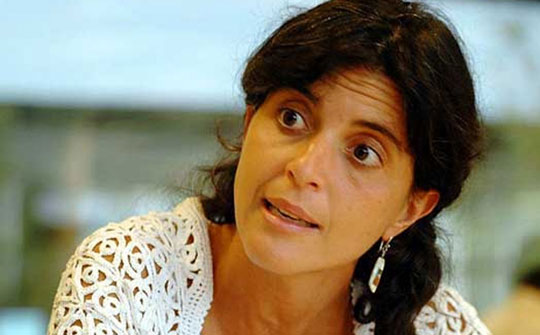 July 2011 – Buenos Aires, Argentina –In a case dubbed by many as “fabricated media politics” and in a desperate effort by corporate contaminators to relax growing environmental controls over contaminating industries such as paper, leather, mining and petrochemical industries, Argentine Judge, Servini de Cubría ruled, after reviewing hundreds of boxes of evidence obtained through court orders, that accusations against environmentalist Romina Picolotti of mismanaging public funds when she served as State Secretary of the Environment for Argentina, have no merit.
July 2011 – Buenos Aires, Argentina –In a case dubbed by many as “fabricated media politics” and in a desperate effort by corporate contaminators to relax growing environmental controls over contaminating industries such as paper, leather, mining and petrochemical industries, Argentine Judge, Servini de Cubría ruled, after reviewing hundreds of boxes of evidence obtained through court orders, that accusations against environmentalist Romina Picolotti of mismanaging public funds when she served as State Secretary of the Environment for Argentina, have no merit.
Complaints filed against Picolotti date back to when she served as the State Secretary of the Environment for Argentina between 2006 and 2008.
They were filed by the political opposition to President Kirchner’s government, and then magnified by the Argentine media giant Grupo Clarín, whose newsprint paper production industry was one of the companies Picolotti was trying to shut down for violating environmental laws.
At the time of the complaints, Picolotti was in the midst of deep environmental compliance reforms atArgentina’s Environment Secretariat, (which was elevated to Ministerial Status upon Picolotti’s recommendations to then President Nestor Kirchner). Those reforms, which included mandating environmental insurance, creating an effective compliance police force, carrying out audits and closures (more than 8,000 acts of control were registered during her three years in office), and undergoing regular inspections (which had never previously occurred) infuriated corporate lobbies in sectors such as metals, extractives, petrochemical, pulp and paper. Many of these corporate lobbies worked behind the scenes and in collusion with certain media groups, like the Grupo Clarín, to remove Picolotti from her post.
In the middle of her term under former President Nestor Kirchner, and in the first year of subsequent President Cristina Fernández, Picolotti was constantly attacked by Grupo Clarín, one of Latin America’s largest media empires and owner of Papel Prensa (one of Argentina’s most contaminating paper pulp producers) which coincidently supplies more than 90% of all printed press paper. Picolotti was well known in the pulp mill sector, as she helped lead advocacy against two pulp mills in Uruguay, which were located on the border with Argentina. She was on a path to have the most contaminating Argentine pulp mills closed and converting the others to cleaner production technologies.
In July of 2007, The Grupo Clarín ran a front-page story attacking Picolotti, without actually presenting any evidence whatsoever against her. The article used suggestive wording to generate public suspicion, such as referring to Picolotti’s “strange management”, making unexplained references to “irregular contracts” and by mentioning the renting of new office space and the purchase of office furniture “without adequate justification”. The accusations by Grupo Clarin included that she bought the “latest generation computers” for her staff. The original article makes references to “large expenditures without much control”, and suggests that she was paying outrageous salaries for her highest level staff (of 8,000 pesos per month for one of her top aides—a number that was published in bold in the original article—a sum equivalent to US$2,650/month, well under the typical high level salary for public officials), or emphasizing that that dozens of persons hired by Picolotti earned between 4,000 and 5,000 pesos (between US$1,300 and US$1,650). The article also suggested the possibility that she might have regularly utilized private jets to fly around the country—without actually proving that she had. There was even a question about a local theatrical performance about environmental degradation, which took place in Picolotti’s home province of Córdoba, and which was financed by the Environment Secretariat. The prosecutor, who has been publicly accused of working for political opponents, was convinced that the play had never occurred and in fact was a scam to send money to political allies. The source of these accusations, states the article, were disgruntled ex-Environment Secretariat staff whom Picolotti fired soon after assuming control of the Secretariat and discovering inefficiencies and irregularities.
The Grupo Clarín, owner of a vast majority of all television, newsprint and radio programs, was under fire from Picolotti’s newly established compliance team for the extensive contamination from its paper producing industry, Papel Prensa, and attempted with this article, to cast doubt on Picolotti’s credibility and discredit her administration’s work.
The story received great attention during 2007 and 2008, at the height of the Kirchner administration, when political opposition aimed to destroy Kirchner’s strong political capital that carried over to Cristina Fernandez’ tenure. Those accusations grounded on the Clarín article resulted in numerous criminal complaints filed against Picolotti by political opposition members, which have been working their way through Argentina’s slow and cumbersome judicial process.
However, following Judge Servini de Cubría’s extensive investigation into the long list of unsubstantiated accusations, wading through over a 100 boxes of evidence presented by Picolotti, as well as information obtained by numerous court orders, found that there are NO MERITS to the accusations filed against Picolotti. The ruling also included a lack of merit on similar accusations related to alleged campaign financing by the Environment Secretariat of former Córdoba Mayor Luis Juez. Juez was attacked by his political opponents with these accusations just days before he faced a local election for governor ofCórdoba Province; he lost the election by a slim margin.
Romina Picolotti, founder and President of the Center for Human Rights and Environment (CEDHA) and winner of several global environmental prizes, including the Sophie Prize 2006 and the US EPA’s the Climate Protection Award 2008 while serving as Secretary of the Environment for Argentina 2006-2008, maintained her innocence at the time of the accusations, and pointed to Clarín as the source of said accusations because it’s pulp mill was on the verge of closure for violating environmental laws.
During her terms as Secretary of the Environment, Picolotti’s strong enforcement and compliance activities included shutting down corporate giants such as Shell, Danone, Firestone, Bridgestone and Petrobras, among others, for violating environmental codes. Among her many recognized public achievements as Secretary of the Environment, Picolotti set up the Riachuelo Basin Authority, which included designing and launching a river clean-up program that is currently underway, negotiating the passage of the national forestry law (the first inventory of national forest reserves), introducing a formal environmental education in public schools, approving of a national battery law, negotiating a national glacier protection bill, as well as regulating environmental insurance. At the international level, as Secretary of the Environment, Picolotti was instrumental in getting the Montreal Protocol countries to agree to an accelerated phase-out of non-CO2 gases, which will have the equivalent impact of many times what a successful Kyoto Protocol would have had. It was because of this effort that Argentina, and Picolotti personally, won the EPA’s 2008 Climate Protection Award.
Romina Picolotti resigned as Secretary of the Environment of Argentina in December of 2008, following President Cristina Fernandez’ veto of the National Glacier Law, which was unanimously passed by both houses of Congress, but opposed by Barrick Gold. She now serves as President of the Center for Human Rights and Environment (CEDHA).
In Grupo Clarin’s extensive news outlets, including radio, television and newsprint, there was absolutely no mention of the court’s no merit ruling in Picolotti’s case.
For more information:
+54 9 351 507 8376

